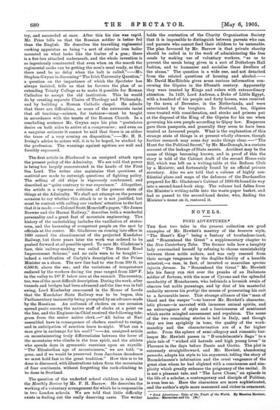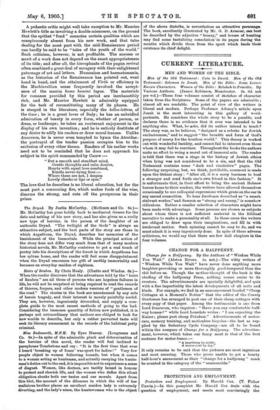FOND ADVENTURES.*
THE first two tales in the present collection are good examples of Mr. Hewlett's mastery of the bravura style, " The Heart's Key " being a fantasy of troubadour-land, and " Brazenhead the Great " a supplementary chapter to the New Canterbury Tales. The former tells bow a haughty lady overreached herself by refusing to choose unmistakably between three noble suitors, and was only rescued from their savage vengeance by the doglike fidelity of a humble minstrel,—a case, in fact, of inverted or masculine spretae injuria formae. In " Brazenhead the Great" Mr. Hewlett lets his fancy run riot over the pranks of an Italianate soldier of fortune, with the nose of Cyrano and the splendid mendacity of Munchausen, who befriends a lovesick swain of obscure but noble parentage, and by dint of his masterful audacity secures his protggg the means of prosecuting his suit to a favourable issue. This strange alliance of the " man of blood and the weeper "—to borrow Mr. Hewlett's character. istic phrase—is narrated with immense animal spirits, and an extravagance of style and a lusciousness of sentiment which excite mingled amusement and repulsion. The scene of the two remaining stories is laid in Italy, and though they are less sprightly in tone, the quality of the work- manship and the characterisation are of a far higher order. From the sphere of semi-allegory and romantic bur- lesque Mr. Hewlett passes in ‘• B uondelmonte's Saga" to a plain tale of " wicked old hatreds and high young loves " in Florence in the days before Dante and Giotto. The plot is extremely straightforward, and Mr. Hewlett, abandoning panache, adapts his style to his argument, telling the story of Buondelmonte's infatuation and the cruel vengeance of the great clan whom he had slighted with a conciseness and sim- plicity which greatly enhance the poignancy of the recital. It is not a pleasant tale, and " The Love Chase," an episode in the life of a scholar, a contemporary and disciple of Politian. is even leas so. Here the characters are more sophisticated, and the author's style more mannered and richer in ornament
A pedantic critic might well take exception to Mr. Maurice Hewlett's title as involving a double misnomer, on the ground that the epithet " fond " connotes certain qualities which are conspicuously absent from his new work, and that tales dealing for the most part with the mid-Renaissance period
can hardly be said to be " tales of the youth of the world." Such criticism, however, is not profitable. The success or merit of a work does not depend on the exact appropriateness of its title; and after all, the hierophants of the pagan revival often combined a great deal of savagery with their enlightened patronage of art and letters. Humanism and haematomania, as the historian of the Renaissance has pointed out, went hand in hand, and the attainment of Virtu or efficiency in the Machiavellian sense frequently involved the accept- ance of the maxim homo homini lupus. The materials
for romance provided by this period are inexhaustibly rich, and Mr. Maurice Hewlett is admirably equipped for the task of reconstituting many of its phases. He
is steeped in the literature, especially the belles-lettres, of the time ; he is a great lover of Italy ; he has an unbridled
admiration of beauty in every form, whether of person, or dress, or landscape; he takes an exuberant enjoyment in the display of his own invention ; and he is entirely destitute of any desire to edify his readers or draw moral lessons. Unlike Anacreon, he is never even tempted to hymn the Atreidae : the portrayal of the tender passion occupies him to the exclusion of every other theme. Readers of his earlier works need not to be reminded that he does not approach his subject in the spirit commended by Carew :— " But a smooth and steadfast mind, Gentle thoughts and calm desires, Hearts with equal love combined, Kindle never-dying fires:— Where these are not, I despise Lovely cheeks or lips or eyes."
The love that he describes is no liberal education, but for the most part a consuming fire, which makes fools of the wise, disarms the strong, and cuts off the prosperous in their prime.











































 Previous page
Previous page